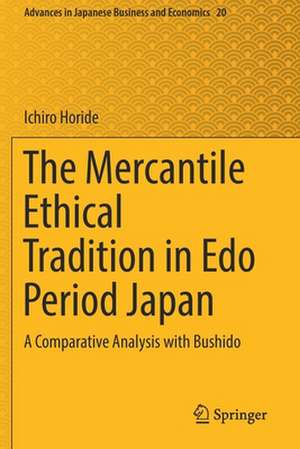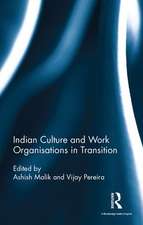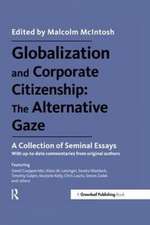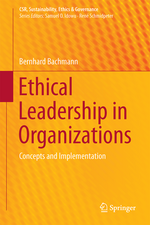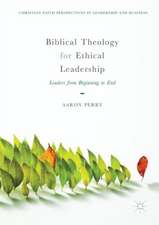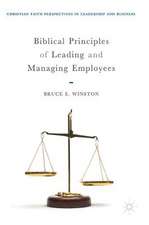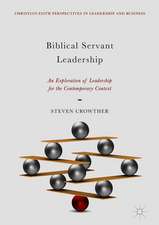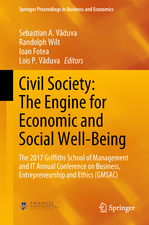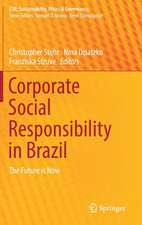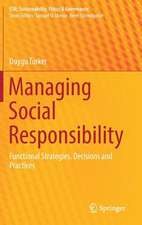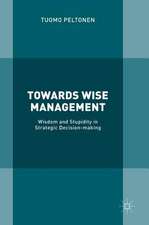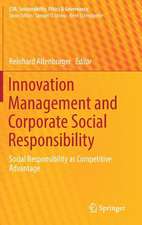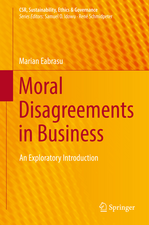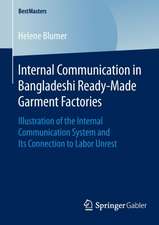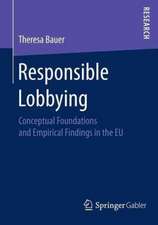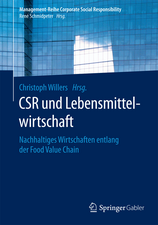The Mercantile Ethical Tradition in Edo Period Japan: A Comparative Analysis with Bushido: Advances in Japanese Business and Economics, cartea 20
Autor Ichiro Horide Traducere de Edward Yagi, Stanley J. Ziobro IIen Limba Engleză Paperback – 14 aug 2020
Japanese society was strictly stratified into four distinct and formally recognized classes: warrior, farmer, craftsman and merchant. From the warriors’ perspective, the merchants, at the base of the social order, had no virtue, and existed only to skim profits as middlemen between producers and consumers. But were these accusations correct? Were the merchants really unethical beings who engaged in unfair business practices? There is ample evidence that negates the ubiquitous slanders of the warrior class and suggests that merchants – no less than the warriors – possessed and acted in accordance with a well-developed ethical code, a spirit that may be called shonindo or “The Way of the Merchant.” This book examines whether a comparison of shonindo, depicting the ethical point of view of the merchant class, and Bushido, embodying that of the warrior class, reveals that shonindo may have in fact surpassed Bushido in some aspects. Comparing contemporarily published historical documents concerning both shonindo and Bushido, as well as Inazo Nitobe’s classic work Bushido: The Soul of Japan, published in 1900, the author examines how Bushido surpassed shonindo in that warriors were willing to die for their strict ethical code. Shonindo, however, may have surpassed Bushido in that merchants were liberal, willing to expand and extend application of their ethical beliefs into all aspects of everyday life for the overall benefit of society. This ethical code is compared with that of the conservative Bushido, which demonstrably proved not up to the task for the modernization and improved well-being of Japan.
Ichiro Horide is professor emeritus of Reitaku University. Edward Yagi (Reitaku University) and Stanley J. Ziobro II (Trident Technical College) collaborated in the translation of the original Japanese manuscript into English.
| Toate formatele și edițiile | Preț | Express |
|---|---|---|
| Paperback (1) | 887.86 lei 6-8 săpt. | |
| Springer Nature Singapore – 14 aug 2020 | 887.86 lei 6-8 săpt. | |
| Hardback (1) | 893.84 lei 6-8 săpt. | |
| Springer Nature Singapore – 16 iul 2019 | 893.84 lei 6-8 săpt. |
Din seria Advances in Japanese Business and Economics
- 24%
 Preț: 619.83 lei
Preț: 619.83 lei - 20%
 Preț: 557.70 lei
Preț: 557.70 lei - 24%
 Preț: 789.77 lei
Preț: 789.77 lei - 15%
 Preț: 646.30 lei
Preț: 646.30 lei -
 Preț: 390.63 lei
Preț: 390.63 lei - 18%
 Preț: 736.64 lei
Preț: 736.64 lei - 18%
 Preț: 722.88 lei
Preț: 722.88 lei - 18%
 Preț: 730.16 lei
Preț: 730.16 lei - 15%
 Preț: 644.30 lei
Preț: 644.30 lei - 15%
 Preț: 583.28 lei
Preț: 583.28 lei - 18%
 Preț: 730.65 lei
Preț: 730.65 lei - 18%
 Preț: 785.11 lei
Preț: 785.11 lei - 18%
 Preț: 731.10 lei
Preț: 731.10 lei - 15%
 Preț: 647.27 lei
Preț: 647.27 lei -
 Preț: 389.31 lei
Preț: 389.31 lei - 24%
 Preț: 599.83 lei
Preț: 599.83 lei - 15%
 Preț: 526.83 lei
Preț: 526.83 lei - 18%
 Preț: 784.30 lei
Preț: 784.30 lei -
 Preț: 389.70 lei
Preț: 389.70 lei - 18%
 Preț: 723.56 lei
Preț: 723.56 lei - 18%
 Preț: 999.60 lei
Preț: 999.60 lei - 18%
 Preț: 724.80 lei
Preț: 724.80 lei - 18%
 Preț: 724.00 lei
Preț: 724.00 lei - 18%
 Preț: 949.10 lei
Preț: 949.10 lei - 18%
 Preț: 780.52 lei
Preț: 780.52 lei - 18%
 Preț: 784.13 lei
Preț: 784.13 lei -
 Preț: 394.29 lei
Preț: 394.29 lei - 15%
 Preț: 642.18 lei
Preț: 642.18 lei - 15%
 Preț: 649.22 lei
Preț: 649.22 lei -
 Preț: 391.22 lei
Preț: 391.22 lei -
 Preț: 390.63 lei
Preț: 390.63 lei - 27%
 Preț: 517.85 lei
Preț: 517.85 lei
Preț: 887.86 lei
Preț vechi: 1082.76 lei
-18% Nou
Puncte Express: 1332
Preț estimativ în valută:
169.89€ • 177.38$ • 140.61£
169.89€ • 177.38$ • 140.61£
Carte tipărită la comandă
Livrare economică 05-19 aprilie
Preluare comenzi: 021 569.72.76
Specificații
ISBN-13: 9789811373404
ISBN-10: 981137340X
Pagini: 233
Ilustrații: XII, 233 p. 1 illus.
Dimensiuni: 155 x 235 mm
Greutate: 0.35 kg
Ediția:1st ed. 2019
Editura: Springer Nature Singapore
Colecția Springer
Seria Advances in Japanese Business and Economics
Locul publicării:Singapore, Singapore
ISBN-10: 981137340X
Pagini: 233
Ilustrații: XII, 233 p. 1 illus.
Dimensiuni: 155 x 235 mm
Greutate: 0.35 kg
Ediția:1st ed. 2019
Editura: Springer Nature Singapore
Colecția Springer
Seria Advances in Japanese Business and Economics
Locul publicării:Singapore, Singapore
Cuprins
1 Introduction.- 2 Why study the ethical thought of merchants in Edo period Japan?.- 3 From “Bushido” to “Shonindo”.- 4 Case Analysis of the Shonindo.- 5 Shonindo: Characteristics and Issues.- 6 Conclusion.- Index.
Notă biografică
Ichiro Horide is Professor Emeritus of Reitaku University, Japan.
Edward Yagi, who supervised the overall translation of the manuscript from Japanese to English, is a Professor of Economics and Business Management at Reitaku University.
Stanley J. Ziobro II, who converted most of the original Japanese manuscript into English, is an Adjunct Professor in Religion at Trident Technical College, USA.
Textul de pe ultima copertă
This book demonstrates that during Japan’s early modern Edo period (1603–1868) an ethical code existed among the merchant class comparable to that of the well-known Bushido. There is compelling evidence that contemporary merchants, who were widely and openly despised as immoral by the samurai, in fact acted in highly ethical ways in accordance with a well-articulated moral code.
Japanese society was strictly stratified into four distinct and formally recognized classes: warrior, farmer, craftsman and merchant. From the warriors’ perspective, the merchants, at the base of the social order, had no virtue, and existed only to skim profits as middlemen between producers and consumers. But were these accusations correct? Were the merchants really unethical beings who engaged in unfair business practices? There is ample evidence that negates the ubiquitous slanders of the warrior class and suggests that merchants – no less than the warriors – possessed and acted in accordance with a well-developed ethical code, a spirit that may be called shonindo or “The Way of the Merchant.” This book examines whether a comparison of shonindo, depicting the ethical point of view of the merchant class, and Bushido, embodying that of the warrior class, reveals that shonindo may have in fact surpassed Bushido in some aspects. Comparing contemporarily published historical documents concerning both shonindo and Bushido, as well as Inazo Nitobe’s classic work Bushido: The Soul of Japan, published in 1900, the author examines how Bushido surpassed shonindo in that warriors were willing to die for their strict ethical code. Shonindo, however, may have surpassed Bushido in that merchants were liberal, willing to expand and extend application of their ethical beliefs into all aspects of everyday life for the overall benefit of society. This ethical code is compared with that of the conservative Bushido, which demonstrably proved not up to the task for the modernization and improved well-being of Japan.
Ichiro Horide is professor emeritus of Reitaku University. Edward Yagi (Reitaku University) and Stanley J. Ziobro II (Trident Technical College) collaborated in the translation of the original Japanese manuscript into English.
Japanese society was strictly stratified into four distinct and formally recognized classes: warrior, farmer, craftsman and merchant. From the warriors’ perspective, the merchants, at the base of the social order, had no virtue, and existed only to skim profits as middlemen between producers and consumers. But were these accusations correct? Were the merchants really unethical beings who engaged in unfair business practices? There is ample evidence that negates the ubiquitous slanders of the warrior class and suggests that merchants – no less than the warriors – possessed and acted in accordance with a well-developed ethical code, a spirit that may be called shonindo or “The Way of the Merchant.” This book examines whether a comparison of shonindo, depicting the ethical point of view of the merchant class, and Bushido, embodying that of the warrior class, reveals that shonindo may have in fact surpassed Bushido in some aspects. Comparing contemporarily published historical documents concerning both shonindo and Bushido, as well as Inazo Nitobe’s classic work Bushido: The Soul of Japan, published in 1900, the author examines how Bushido surpassed shonindo in that warriors were willing to die for their strict ethical code. Shonindo, however, may have surpassed Bushido in that merchants were liberal, willing to expand and extend application of their ethical beliefs into all aspects of everyday life for the overall benefit of society. This ethical code is compared with that of the conservative Bushido, which demonstrably proved not up to the task for the modernization and improved well-being of Japan.
Ichiro Horide is professor emeritus of Reitaku University. Edward Yagi (Reitaku University) and Stanley J. Ziobro II (Trident Technical College) collaborated in the translation of the original Japanese manuscript into English.
Caracteristici
Is the first known attempt to systematically prove the existence of a singular merchants’ ethical code, shonindo, and compares it with the “Way of the Warrior”, or Bushido, in Japan’s early modern Edo period (1603–1868) Analyzes the business ethics of Edo period Japanese merchants Clarifies the influence of virtue derived from three religions or philosophies: Shintoism, Confucianism, and Buddhism Demonstrates differences and similarities between Western and Japanese merchant ethical codes
